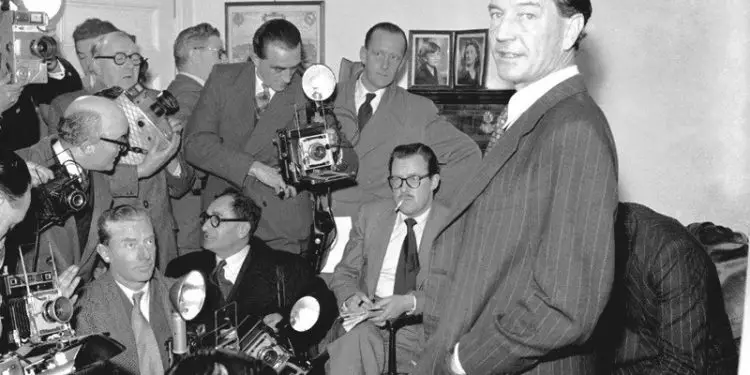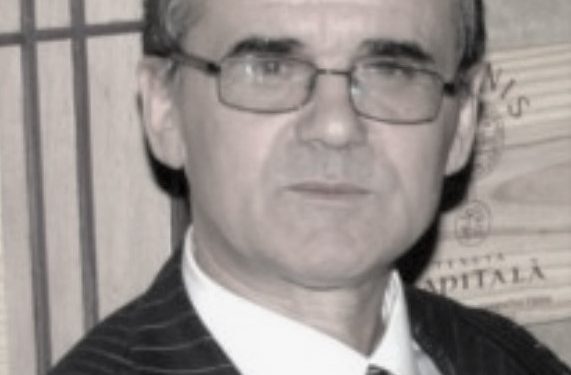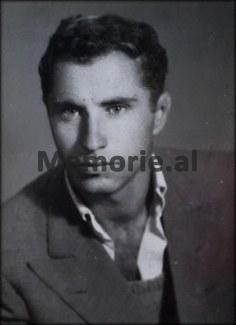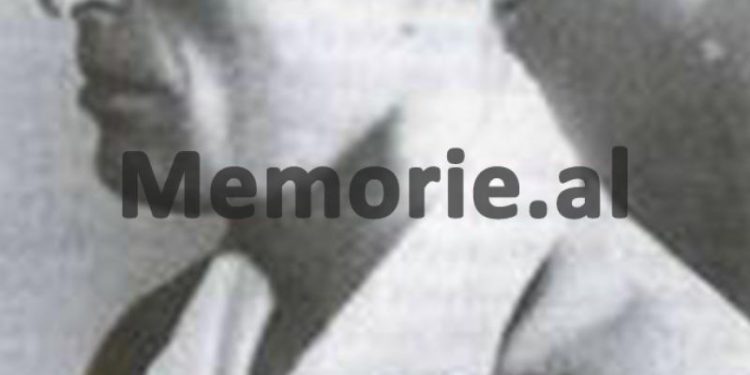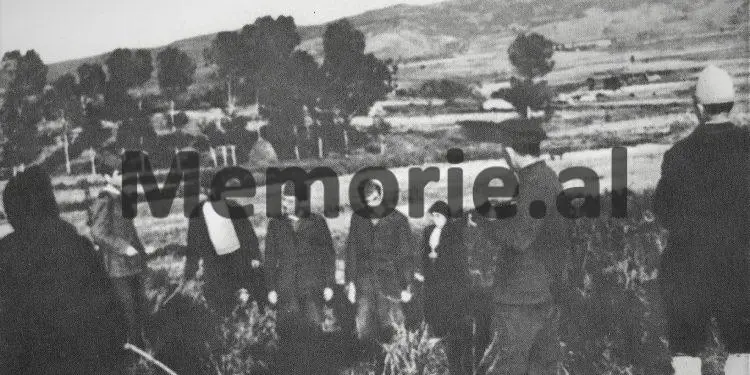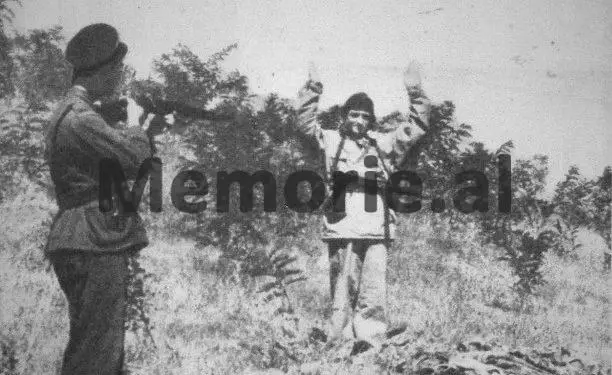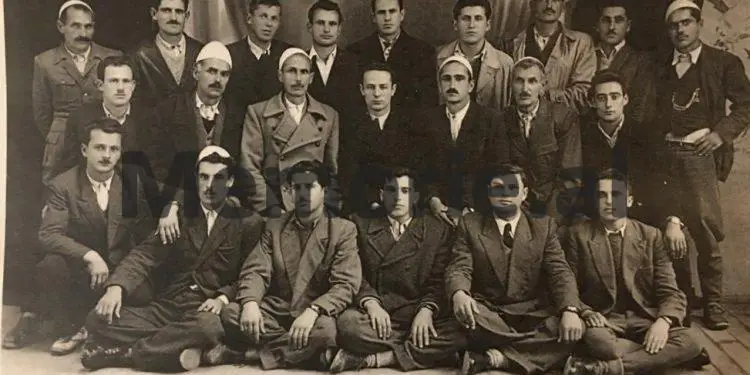By Dalip Greca
Second part
Memorie.al / Confessed for the first time by the USA, one of the paratroopers sent on a secret mission to Albania by the CIA, for the overthrow of the communist regime of Enver Hoxha. About the CIA and ‘Mi-6’ operation against Albania, Zef Luka, one of the few paratroopers dropped by the Anglo-American intelligence agencies, testifies from Cleveland, Ohio, USA, to overthrow the communists and who lived for 13 months in the mountains of Northern Albania, escaping the detachments of the Pursuit Forces, who, assisted by the Russians and Kim Philby, captured and killed most of the paratroopers. Zef Luka, the Shkodran anti-communist who survived and did not fall into the trap set up by the Albanian State Security, in cooperation with Russian counter-intelligence; (trap fed by Kim Philbit, the English double agent, who operated in Washington; later moved to the Kremlin, declared “Hero of the Soviet Union”). Zef Luka, the former paratrooper lives in Cleveland, Ohio, does not forget for a moment the comrades with whom he was connected during the difficult days of the anti-communist war. He has a model diary, which reflects in detail the activity of those, whom he himself calls “One hundred Albanians who came with me to bring freedom”. Zefi’s messages, to write about those who lost their lives in this war, have been frequent, but in a special way, he asked to write about the “professor”, Alush Lleshanaku.
Continues from last issue
Mr. Luka, how did you get in touch with your bases after landing in Albania, how did you secure food?
“At first we decided to go to Mirdita Fan. We were printed by Gjon Gjinaj, who was from that village. We waited until it got dark. John asked me to accompany him. The others stayed. We approached the first house, at the top of the village. I remember it was John Cook’s house. We approached the window, which was closed. John listened and turned to me, and whispered: There is a stranger here, so let’s go away a little. It didn’t take long and a woman came out. John approaches her and asks: – Is your husband at home? – No, he is at work, at the sawmill, – she answers.
Then he turns to John and says: – We heard that you went to Greece. – Yes, – says Gjoni, but last night we met a group of 30 people. Get us bread! – Go and wait at the wall of the new house, because I am bringing you the husband’s brother. You will wait until the mayor of the locality, who is inside the house, goes. After half an hour, Gjon Kuka’s brother arrives, who was shaking with fear. We got in touch with Gjon Kuka after three days, when he returned from Sharrat. Gjon Gjinaj ordered it clearly: Only two houses should know about us, you and the house of Zef Voc. You will feed us during this winter”.
Did you return to Italy again after landing or did you stay long in the mountains?
“New Year’s Eve 1950 found us in the mountains. I remember that night; we were on the top of Runa. It was snowing hard all night. In fact, this night celebrated all over the world, New Year’s Eve, had found us with a sopat and few snacks. Ndue Frisku and Bardhok Gjeta, they were chopping wood to keep the fire burning, all night…”!
Did they kill or poison Alush Lleshanak?
The conversation with Zef Luka aims to answer the title of the article: Did they kill or poison Alush Lleshanak? But to get to the answer, it is worth following the activity of this group of paratroopers, who were among the longest-lived of those who worked in the mountains. While the conversation with Mr. Luka clarifies that the groups that operated in the north, under the nose of State Security, were not few. He mentions the group of Shkodra and Mirdita, that of Kurbin, the group of Elbasan, etc. These groups did not just make a landing or an action and that’s it. No, they stayed a long time in the mountains and set their bases in motion.
They took the way back, when the betrayal was revealed and they saw themselves betrayed by the Anglo-Russian collaboration (Philbi). This was probably one of the few groups where the Russian agency was not infiltrated and the Security had a hard time entrapping them. However, the effort with the Security was inevitable and unequal at the same time. Mr. Luka, you don’t gloss over the bitter reality. He was harsh, like the wild winter in the snow-covered mountains. Often, the groups were bloodied with the Pursuit Forces, but still, Mr. Luka thinks that their sacrifice cannot be called worthless and failed, as some Tirana newspaper wrote.
“Even though some of the groups were betrayed in the cause of the war for the overthrow of the dictatorship, we still showed the world that Albania did not need communism, that’s why we got bloody with it”, says Mr. Luka, in the telephone conversation I had with him. How was their life in the mountains? When did he meet and how did he break up with Alush Lleshanak, when did he learn of the death of his idol? Was it murder in a fight, or was it cut or poisoned? The following interview tries to answer these questions.
I ask Zefi: How did you manage to get through the harsh winter of 1950? What about food, where and how did you get it?
“We spent the winter among the mountains, supplying the sympathizers and supporters of our holy war. I remember that once I saw from afar that John Kuka was coming, with a fugitive in the mountains, due to a blood issue, his name was Pjetër Gjeta. They had brought us a goat and half a sack of bread. This was a real party. That’s how the difficult days of that winter passed. Every day we connected with Rome, at 9 o’clock in the morning, without telling him where exactly we were. As we spent the winter at Maja e Runa, we went down. The snow was up to my waist, it hadn’t started to melt yet.
We walked through the water so we wouldn’t leave any footprints behind. The road we traveled was surrounded by villages that were connected to State Security and the communists. We found shelter and set the table to eat, at Mark Palucë’s place. We would stay at his house for two weeks, then go down to Fushë i Laja. We left some of our comrades, Col. Çunin, Pashko Leta and Nikollë Marku, in Koravë. The rest, Gjon Gjinaj, Pjetër Gjoci, Bardhok Gjeta, Pjetër Gjeta, Mirash Marku, Ndue Frisku and me, Zefa Luka, took the road to Laja Field, where an expected landing would take place”.
All the time you were wandering around with the shroud on your head, how reliable was it that you found the doors open for food?
Of course. I remember that while we were walking towards Fusha e Laja, together with Gjon Gjini, we knocked on a door. A young woman opened the house for us. She didn’t have her husband, the communists had killed her. She immediately brought out bread for us, but we told her that we could not eat her children’s bread. But she was a good woman; she gave it to us with difficulty and said: Take it, because the children will eat tomorrow too! There were always doors opening for us. A little further, we reached the village of Shkozë. We stayed at Nikollë Pjetër Shkoza’s house, where they gave us good food.”
Meanwhile, were there signs that any of the members of the group cooperated with the Security, or gave signs of “surrender”?
“I have always spoken openly and I have not hidden the truth; I also wrote it in my diary. I’ll give you a chance. Nikoll Marku had tried to leave before we arrived in Koravë, but Pashko Letaj and Bardhok Gjeta caught him. In that case, we heard Nikola, who shouted loudly: ‘In your hand, Gjon Gjinaj’! In the meantime, since we had reached the Field of Laja, from 5 o’clock in the afternoon, we received the news from Col. Čuni, who asked us to leave the Field of Laja, because Nikol Marku had managed to escape. We left Fushë e Laja and changed the location of the radio station, for any unexpected”.
Which group was expected to land in Fushë i Laja?
“They told me the truth; I didn’t know which group was expected. It was kept a secret from us. Not only to me, but also to others. It is possible that only Col. Çuni knew, maybe Gjon Gjinaj as well. Later I found out that it was about Alush Lleshanaku”.
Did Alushi’s group land?
“What is the truth, it was not possible to inform Rome about the change we had made and the abandonment of Laja Field. We only had one connection with Rome and the change was made in the afternoon. From 8 o’clock in the evening, we saw the planes that landed at the Laja Field. The next day Roma asked us how the descent was made, but we didn’t know anything”.
What had happened?
“As we learned later, Çup Caf Paluca with Zef Voc, and other friends, had lit fires and the plane had dropped rifles, ammunition, food, and whiskey. We learned that the group of Alush Lleshanak, which also consisted of; Halil Hoxha, Rexhep Kasa, Abedin Çengo, Zenel Çela and Nuri Plaka. When I met Alush after six months, he told me the incident himself: When we fell to Laja, we heard rifles, – he said. Alushi had told Rexhep Kasa: “Go and see if Zefi is there, waiting for us.” But it wasn’t like that. Rexhepi had seen the Pursuit Forces, who were waiting for them and had taken the escape route…!
What happened to you after you left Fushë e Laja?
“The group prepared again, going to Laja. The situation was dangerous, we were exhausted. Kola, designated the group that would go: Mark Paluca as leader, me, Bardhok Gjeten and Pjetër Gjeten. I remember that Ndue Frisku said to me: ‘Zef, I’m going to your country, because you don’t know the country, I was a shepherd in those parts and I know the country’. Bardhok Gjeta was appointed group leader. I saw that Kola and Gjoni whispered something in my ear. I found out later, Kola wanted me to go. According to me, it was Gjon Gjinaj’s turn to go first, and then it was my turn. “Neyse, we were at Mark Palucë’s station, when we split into two groups: they went to Fushë i Laja, while we went to Kërraba”.
What happened to the group that went to Fushë i Laja?
“It was March 29, 1950. Mark Paluca arrived and brought us the news that they had found the parachutes with food, rifles and items dropped by the plane. We started with drinking and eating, then we shot and rifled. Christmas was felt in the village and the Defense patrols headed towards Laja Field, thinking that some group from Yugoslavia had landed there. They met face to face with Bardhok Gjeta, who asked: ‘Who are you’? – Insurance, – they are responsible. Bardhok cursed his mother, emptied his rifle. They also answered. In the attempt, they were killed by both sides. From the Security: Mark Prenga, who was called “Pepi”, lieutenant of the Security and Zenel Çoba, from Qerret i Përm. While from our group, they were killed; Bardhok Gjeta, Ndue Frisku, Pjetër Gjeta and Zef Voci”.
What did the pursuing forces do with the bodies of those killed on your side?
They were stripped of their leather jackets, watches, and wallets (no less than 10 Napoleons each). After they took the dead, they started abusing them, burning them in the face with cigarettes, gouging out their eyes with bottles, tied their legs and dragged them to Sharra e Gojani. Later, they took them and arranged them as best they could, dress them in the clothes they had, apparently the order came that their bodies would be inspected from Tirana, and maybe they would be photographed”.
What about Alushi’s group, how did it go, he asked, did he meet your group?
“Alushi’s group landed, but he had to wait 24 hours in Laja, but he didn’t wait. From the events that happened, they took the road to Elbasan”.
When did you meet Alushi again?
“Many difficult events passed for us. In Kërrabë, Kurbin’s detachment arrives, which, it must be said, was the terror of the Security. The Followers themselves were afraid of those brave men, such as: Pashko Suma, Ndue Lala with his brother, Ndue Gjergji, Mark Mëlyshi. The gang asked us to go together to Kurbin, where the supplies for the gang would come. Guided by them, we went and settled in Perlat, where we stayed for almost a month. After a month, we headed towards Kurbin, where we were to meet with the Kurbin squad. The meeting would take place at the old women’s station in Jak.
On a slope with junipers, we left our radio companions. Pashko Suma stood his left ear and says to me: “Zef, it seems to me that there is a stranger here”. Behind a juniper tree we find Luk Prezefi of Kurbin’s squad, he was completely covered in blood. We took him with us’ after he was treated by Pashko Leta, who was also a nurse. The lord of the stan tells us how Kurbini’s detachment was ambushed, and how Ndue Lala was conquered. In the evening, we arrived in Munella, exhausted and tired”.
In the meantime, you maintained ties with Rome and did they supply them after all this time?
“Yes, the connections were regular. Even supplies. After the loss of Kurbin, supplies came to us by plane, which landed there from 9 o’clock in the evening. Supplies fell in Domgjon. In fact, we found only one of the loads, the one with clothes, another one, where the money was, first gold, was not found. I remember that night; I got a brown jacket, with four big pockets, with my name, Zef, written in pen. Later I forgave Pashko Suma, the poor man was killed with him, after two months, when the Kosovar group fell in an attempt, in Perlat, Mirdita, together with Captain Riza Osmani”.
What was the last meeting with Alush Lleshanak?
“In September 1950, we were escorting Tahir Hoxha, who was in the Kosovar group, to the border with Yugoslavia. I, Pal Mirakaj and Ded Pjetra were appointed. Then, together with Pal Miraka and Dod Pjetri, we are on Dardha mountain. From here we go to Qafë-Mali, to pick up Gjon Gjinaj and Alush Lleshanak, to supply them with radios. Pali stopped at a well-known base, where a meeting was waiting for him, while I, escorted by a child of that house, went towards Alushi and Gjon Gjinaj, Pjetër Gjoci, Ndue Mëlyshit and Zef Kryeziu. They had come from Yugoslavia, but decided that night to return. I met with them. Before the light dawned, Pal Mirakaj and Ded Pjetra arrived and together, we headed towards Puka.
We passed Kroi i Shkjau, to Bjeshka e Prroni i Kijave, we headed towards the radio station, which was in Berishe, the place was called Kotec. After passing the post office of Iballa, some corn fields lay before us. Alushi filled the bag with soft corns. I remember he was wearing a pair of black trousers and a thick woolen flannel, which he used when we stopped to rest. He had hand grenades, the paratroopers’ ‘Car’ and the ‘Bereta’ with him. We stayed in Kotec for a week. We left this base because one day we were seen by two people who passed by; man was a forest officer. We went to Balaj. We were waiting for it to get dark and cross the bridge, which was close to the command of the country, of Iballa.
The place was difficult; there were marshy swamps all around. The group that was going to pass consisted of Alush Lleshanak, Gjon Gjinaj, Pjeter Gjocit, Ndue Lush Mirakaj, Gjon Lush Mirakaj, Pashko Demit, Pal Mirakaj, Kol Čuni, Pashko Letaj, Mirash Markut, Ded Pjetre, and me, Zef Luke. After many difficulties we passed, at first I was alone with Gjon Gjinaj, even though we were not local. When we got to the bjeshka in Mezij, Mark Zogu brings the radio that we had as a spare, stored in a bin covered with oak. This was for Alush Lleshanak. Meanwhile, Vat Staka arrives, bringing us a basket of grapes. He stayed three days with us.
When he makes his way back to the village, he meets a woman who was carrying water, who warned him: ‘Don’t go home because Sigurimi is waiting for you. He also found the revolver with cartridges’. I had that revolver thanks to Vata. After that, he could no longer go to the village, he stayed with us. At that time, Alush Lleshanaku called me aside and said: ‘Zef, my friends are bored and want to go to Yugoslavia. You come to me in Elbasan’. I remember that I answered him: ‘As long as you are in Albania, I have a place to stay’! And I stood by the promise I made. Alushi had decided to die, not to leave Albania. We gave the radios to Alushi, Gjon and Pjetri and parted with them…”!
When have you felt the saddest during your years in the mountains?
“There have been a lot of them, but I felt very sad when my close friend, Mark Hajdar, was killed. He was brave. His family was with the communists, he himself was against it. Often together with him, we went around the village; we slept near some path or road, at night he sang, in the dome of the sky”.
It has been said that the UDB also had a hand in the anti-communist groups. Was your group connected to the Yugoslav services?
“I did not surrender to the Yugoslavs, neither in the most difficult moments, nor in traps and pressures. Even the group had nothing to do with Belgrade. We took our orders from Rome. I will also tell you an incident that happened to me. H. Sh., seemed to have a weak spot for UDB. After I found out that he distributes UDB literature, I called him one day and said: What are you doing, you took the letters of Koçi Xoxes, who then killed us, did the party catch us, they had us paste the pictures of Koçi Xoxes, the one who killed your brother, and our Catholic Clergy on your face? – ‘How? – He said, – he killed my brother? – Yes, why, I don’t know? – I answer.
We were walking along the banks of the Drin, when H. Sh. opened his bag and threw the flyers into the river water…! But after a while, he came back to Yugoslavia. I learned that he was part of the Apostol Tenefi Committee. After 4 years in Yugoslavia, he went to the West. It was also taken in the interview. “Neyse, what’s the matter, we understood that he was an agent of the Security of Albania”. Memorie.al
The next issue follows




